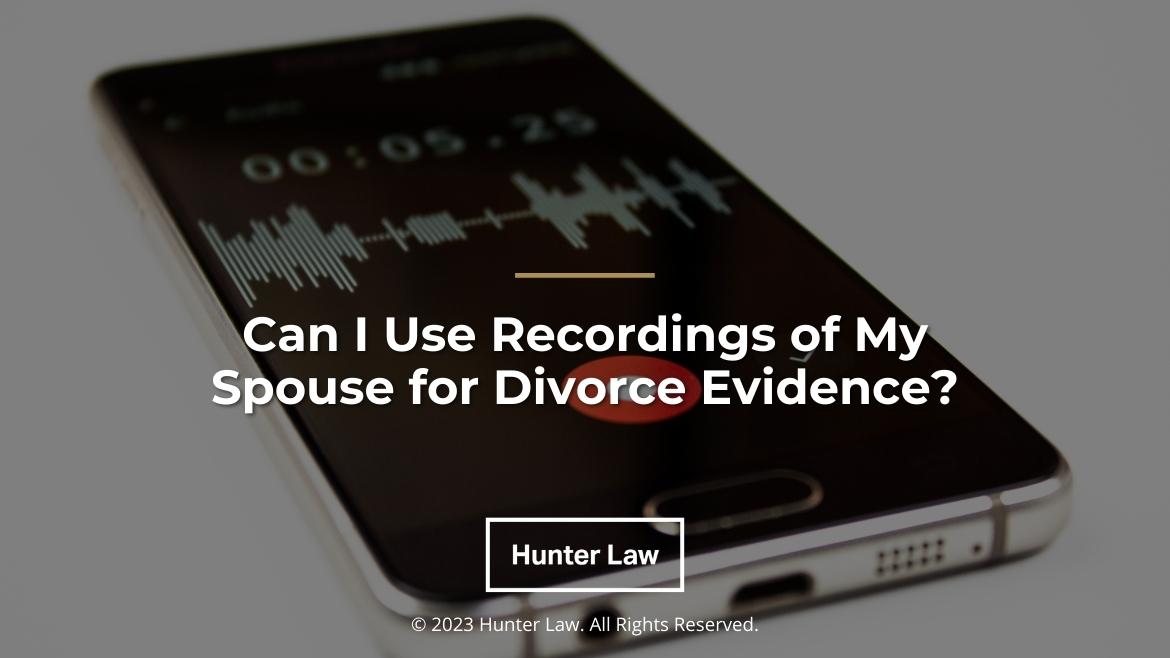In any divorce case, gathering evidence to support your side of the story is vital. That’s doubly true in cases where your spouse is being abusive or when you’re trying to sway the judge to your side on matters of child custody or child support payments. But only some type of evidence is admissible in divorce cases. If you’re wondering whether you can use recordings of your spouse as evidence in a Florida divorce court, read on. We’ll break down the details of this question.
Florida: An “All-Party” State
Put simply, Florida is an “all-party” state. That means everyone involved in a recorded conversation must be informed of and consent to be recorded in the first place for that evidence to be admissible in court. If these conditions are not met, any recorded conversation can’t be used as evidence.
The all-party designation applies to anyone involved in the conversation, not just the two primary parties. Anyone who takes part in the conversation (verbally or orally) must be informed of the recording and consent to recording for the conversation to be admissible. You can read more in our blog; Is It Legal to Record a Conversation on My Mobile Phone (or Cell Phone)
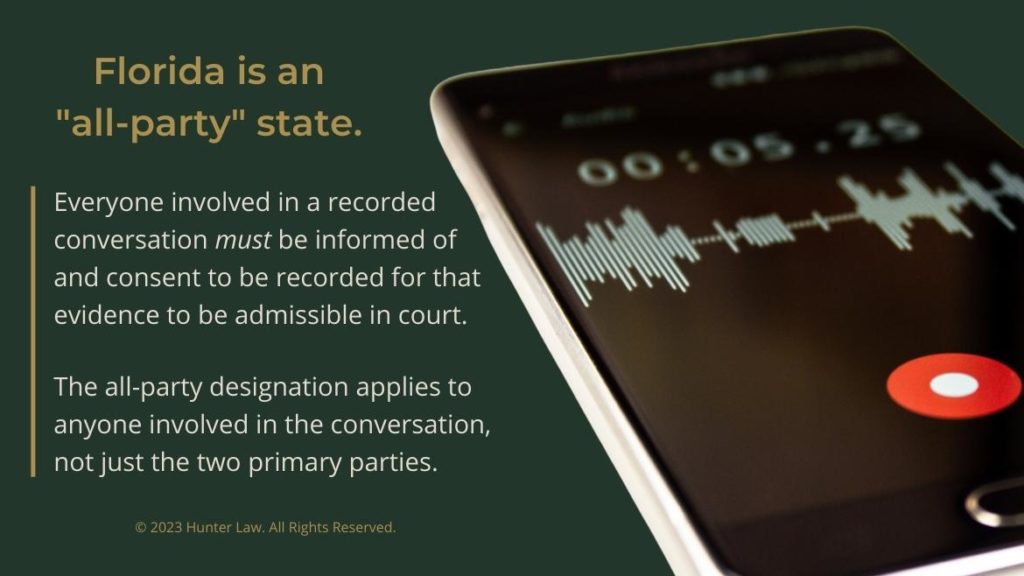
So, Can You Record Your Spouse for Divorce Evidence?
Sometimes. So long as you and your spouse both agree to be recorded, the recorded conversation may be submitted as divorce evidence.
For example, imagine that you and your spouse have an in-depth talk about child support or child custody arrangements. You and your spouse both agree to record the conversation for evidence purposes. That conversation can be used as evidence in divorce court that you both reached an agreement.
But if you talk to your spouse about child custody with a hidden recording device on your person, like a tape recorder with a microphone beneath your shirt, or if you record a phone call with them without their knowledge, that recording can’t be submitted as evidence. Read more in our article: Can I Use Recordings of My Spouse for Child Custody Evidence?
There are two big exceptions to the above rule, however.
The Expectation of Privacy Exception
First, the above consent rule only applies in instances where there is a reasonable expectation of privacy for the conversation at hand. For example, if you and your spouse have a conversation in the home, they can reasonably expect privacy, and you can’t record the conversation without their consent.
But if you and your spouse have a conversation about child custody or some other sensitive topic in public, there is no reasonable expectation of privacy. Therefore, you can record anything said in public (or in any other area where privacy isn’t a given) and submit those recordings as evidence in divorce court, even if your spouse doesn’t consent to it.
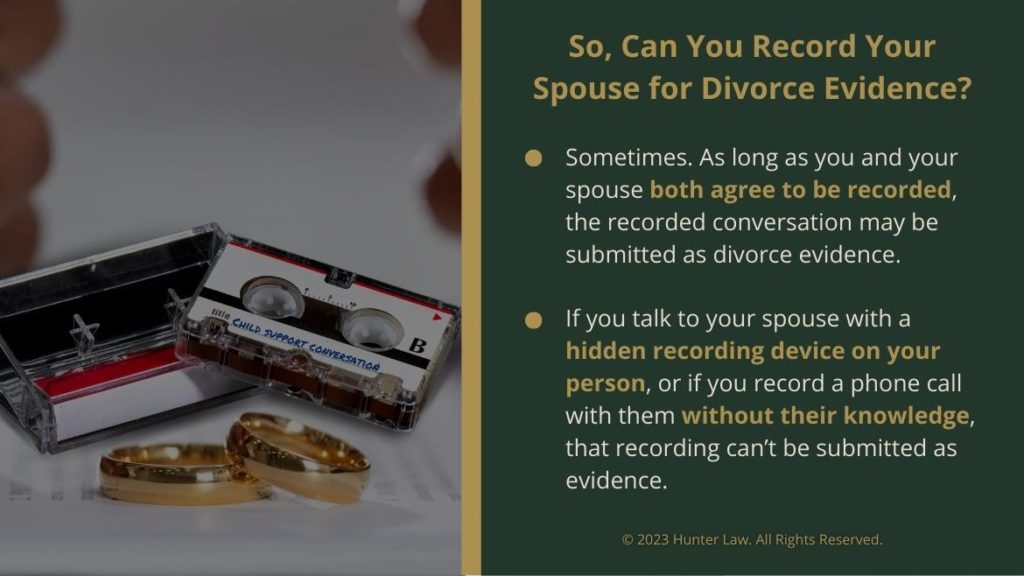
The Received Information Exception
Secondly, if your spouse gives you any information, that information may be admissible in court. This is true even if you received the information by accident.
For instance, if you’re involved in a complex divorce case, and your spouse sends you a recording between them and their attorney by accident, that evidence is admissible in court (even if they later ask you to return the recording or not to submit it).
What if You Record Your Spouse Without Their Knowledge/Consent?
This is never a good idea. Recording your spouse without their knowledge or consent beforehand is not only bad for your case (since the evidence is inadmissible); in Florida it’s also a criminal act (a felony). And, if you share the recording with anyone, for example, by attaching the recording to an e-mail or a text message, each time you do that, it is a new and separate criminal act. You could end up with multiple felony charges just by recording your spouse and then sharing the recording.
If you record your spouse without their consent or knowledge, you could face heavy fines and legal penalties in civil and criminal court. In addition, the judge for your divorce case may look upon your side of the case more harshly since you broke the rules.
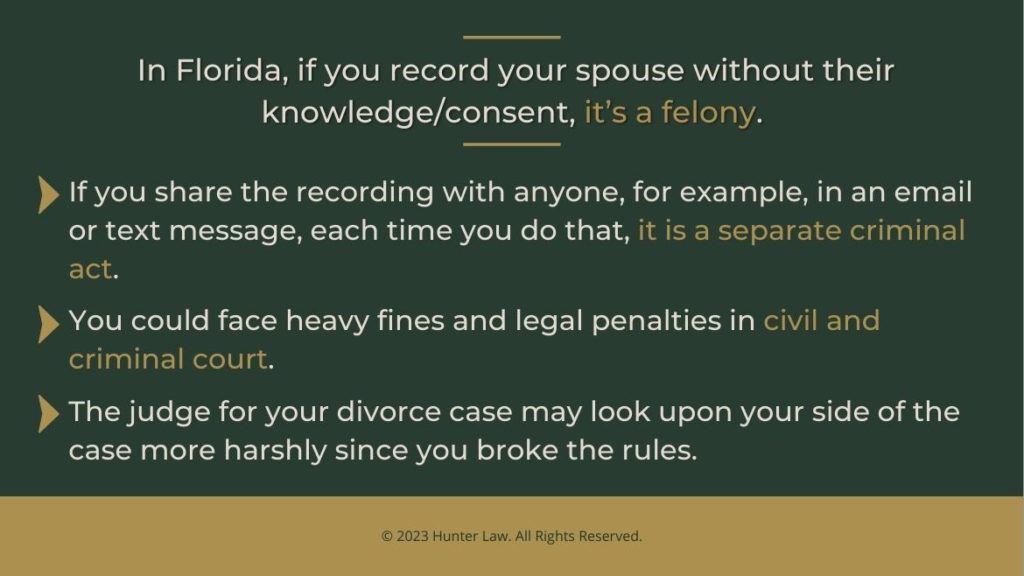
Other Communication Recordings in Florida Divorce Cases
Video and audio recordings aren’t the only types of communication that you can submit as evidence in a divorce case. Let’s take a look at how and when you can submit other types of recordings or communications in Florida divorce cases.
Text Messages
Text messages that are sent to or from you and your spouse may generally be saved and then submitted to the court as evidence. This includes any text messages that you or your spouse don’t explicitly consent to be submitted.
Generally, text messages are considered to be correspondence like physical letters. Therefore, if your spouse sends you any text message, that text can be fair game in court. That’s why many Tampa divorce lawyers recommend that divorcing couples don’t communicate with each other without using their lawyers as intermediaries.
Emails
Similarly, any emails sent to or from you and your spouse may be admitted in court as evidence in a divorce case. The same rules and philosophies apply as described above; if your spouse sends you an email, they consent to you providing that email as evidence by default, even if they don’t explicitly consent.
Social Media Posts
Social media platforms are broadly considered to be public platforms. If you can gain reasonable access to your spouse’s social media posts, those posts can be submitted as evidence in your divorce case.
There are some exceptions to this. For example, if you “hack” into your spouse’s Facebook profile by using their password, any posts you get through that method are not admissible.
But if your spouse has their profile set to “public,” or if they are friends with you on a social media platform and you can see their posts, anything they post is fair game in divorce court. The same is true for any other online posts on forums, YouTube videos, etc.
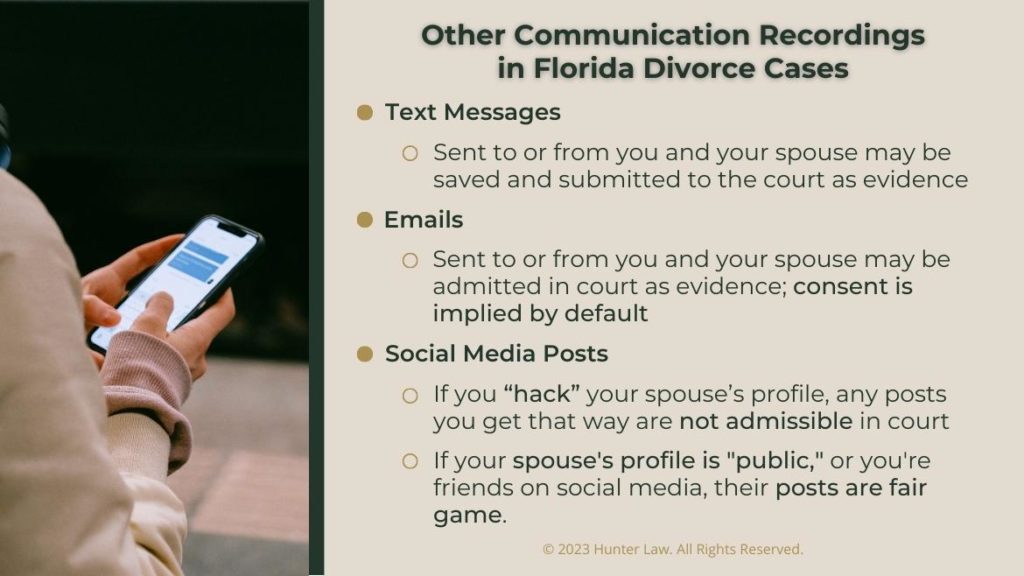
Contact Tampa Divorce Lawyers Today
You can’t use any recordings of your spouse as evidence in divorce court if those recordings were acquired without their knowledge or consent. However, you can still collect a wealth of other evidence, social media posts, or text messages, to support your side of the story in a divorce case.
Knowledgeable divorce lawyers like Hunter Law Group can help with this aspect of your case and much more. Our Tampa law firm has seen dozens of instinct cases and knows what to do to make your claim as strong as possible. Contact us today to learn more.


